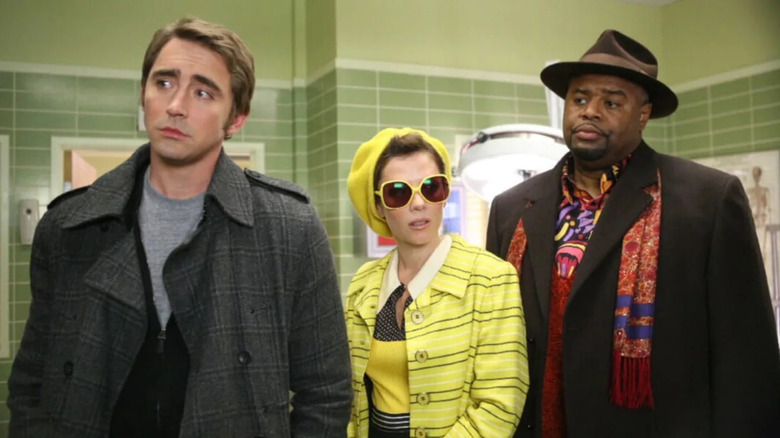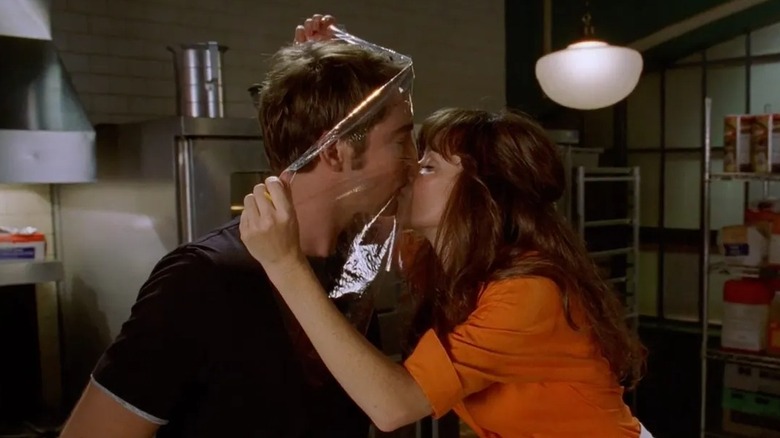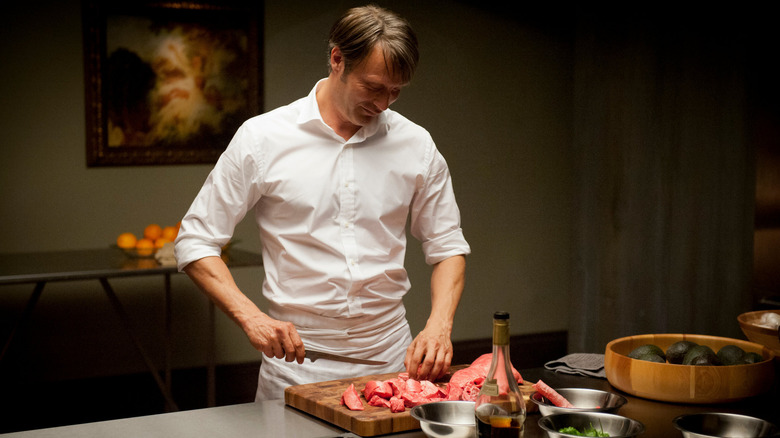Pushing Daisies' Producer Blames 'Cute' Scripts For Getting The Series Canceled
Created by Bryan Fuller, "Pushing Daisies" followed Ned the Pie-Maker (Lee Pace), who had the seemingly magical power to resurrect the dead with a touch. His ability came with rules. One, Ned couldn't touch anyone he brought back to life or they would die again, permanently. Second, if Ned doesn't "re-dead" someone within 60 seconds, then someone else's life will be taken in an equivalent exchange.
Ned uses his ability to assist sardonic private investigator Emerson Cod (Chi McBride) in solving murder cases. Thanks to Ned, Emerson is able to interview the victims. The pilot's ("Pie-Lette") case of the week features Ned's childhood crush Charlotte "Chuck" Charles (Anna Friel) as the murdered party. Ned can't bear to "re-dead" her, but now the two have to make their relationship work even though they can't touch each other.
During its brief life from 2007 to 2009, "Pushing Daisies" was one of the most unique television shows on the air. Unfortunately, it arrived at the wrong time. The Writers' Guild of America called a strike just when the series started. That truncated the first season and meant it didn't have a sufficient audience going into its second. Kristin Chenoweth (who played Olive Snook) for one, cited the strike as the cause of the cancellation. Producer Barry Sonnenfeld, on the other hand, has a different explanation and it concerns the show's tone.
Fear of losing the quirkiness
Murder mystery shows are by nature morbid since there's a new death every week. "Pushing Daisies" embraced this morbidity but mixed it with the lightness of a fairy tale; even the series' name reflects this mix of the cheerful and the ghoulish. The dialogue was quirky but not smarmy; characters would speak in loops or colorful metaphors, and the narrator (Jim Dale) was the most verbose of all. Visually, the production design evoked the 1950s drenched in a rainbow color palette.
Fuller modeled this on Jean-Pierre Jeunet's "Amélie," his favorite movie. As he told The New York Times in 2007, "All the things I love are represented in that movie. It's a movie that will make me cry based on kindness as opposed to sadness." The influence didn't go unnoticed.
However, Sonnenfeld feels the uniqueness of "Pushing Daisies" ultimately undermined it. Speaking to the Huffington Post in 2017, Sonnenfeld acknowledged the WGA strike as one cause, but felt the show's writing was another.
"I blame our scripts, in that I think they were slightly too cute. I wish they'd had a little bit more plot.I remember saying to Bryan Fuller, who was the showrunner and the creator and a good friend of mine who I adore, 'Hey, Bryan, shouldn't we have better plots so we can lean forward in trying to figure out who did the murder, for instance?' He was afraid if we had a little bit more of a procedural that we would lose the quirkiness."
It's clear Fuller cares more about telling his stories the proper way instead of making them broadly popular. He's even left more than one series over creative disagreements.
Procedurals in disguise
Fuller's next series, "Hannibal," was also a quirky murder mystery show. However, instead of the bright fairy tale world of Fuller's previous series, "Hannibal" was steeped in gothic horror and a darker color palette. After all, you can't have things being too sunny when Hannibal Lecter (Mads Mikkelsen) is involved.
The premise of "Hannibal" (Will Graham and Dr. Lecter solving murders together before the events of "Red Dragon") isn't very good on paper. It sounds like a mix of the 2010s' reboot/prequel-obsessed culture and the by-the-numbers procedurals which dominate network TV. Lecter, however, made something unique — not to mention romantic.
By mid-season 2, the case of the week stories on "Hannibal" were gone and the series was wholly focused on Hannibal and Will's burgeoning (and deeply twisted) relationship. Indeed, the show had become so different by its end that coroners Price (Aaron Abrams) and Zeller (Scott Thompson) showing up in the series finale was a surprise.
"Hannibal" lasted longer than "Pushing Daisies," but still only ran for three 13-episode seasons. If "Pushing Daisies" was too cutesy for casual viewers, then "Hannibal" was too grotesque. The light that burns brightest also fades the quickest.


